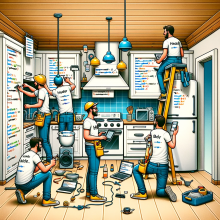Use Docker
Use Docker! Docker lets you create virtual computers, so that you can have miniature versions of your live site.
You don't need to use Docker on its own, and probably shouldn't -- use of the environments that make it easier. Any one of these three will do the trick -- choose whichever one feels right to you.
DDEV (https://ddev.com) seems to have the biggest following within the Drupal world these days; there's even a few folks pushing to adopt it as a standard.
- Read more about Use Docker
- Log in or register to post comments










